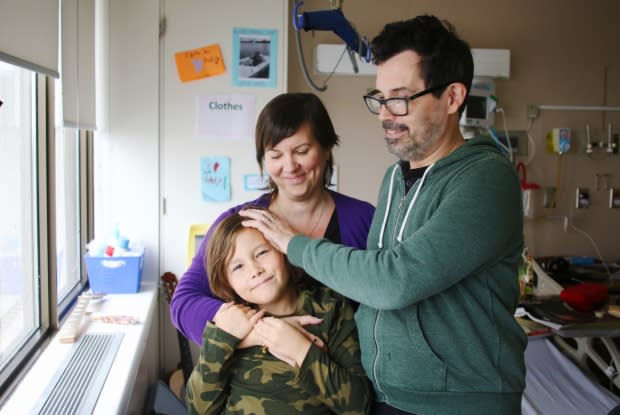Partner of Ottawa man with brain injury says he faces 'inhumane' wait for specialized care
The family of an Ottawa man who suffered a brain injury last summer is concerned it could be months, even years, before he gets the treatment they say he needs.
Shawn Hill was returning from a bachelor party in late August 2018 when the chef and musician fractured the back of his skull, likely in a fall, just blocks from his home.
Initially, he seemed to be on the path to recovery. But about 10 days later, he slipped into a coma and suffered seizures and a pair of strokes, waking up with symptoms such as significant confusion and an inability to form new memories.
While Hill has been able to relearn basic tasks like walking and dressing himself, the mental impairments remain.
A few months ago, his specialized rehabilitation team at the Ottawa Hospital decided he'd "plateaued" and his spot would be given to someone who needed it more, said Melissa Acheson, Hill's partner.
As a result, the 44-year-old was moved to a room in a secure ward at the hospital's General campus. He now shares the room with three seniors.
He doesn't understand why he's there. He feels like he's in prison. - Melissa Acheson, Shawn Hill's partner
"He doesn't need to be taking an acute-care bed in a hospital," said Acheson, who was with their nine-year-old son Levi as they sat in the hospital's cafeteria.
"I'm concerned that he will actually start to decline even more cognitively, because he's not getting the interaction and the support that he needs."
Hill is now waiting for a spot to open up at either a local long-term care home or one of two specialized treatment facilities in Ottawa for people with acquired brain injuries, or ABIs.
The wait list for the care home could be anywhere from three months to three years, Acheson said.
For the specialized centre, it could take a decade or more.
"He talks to me about how he doesn't understand why he's there. He feels like he's in prison and he doesn't understand what he's done," Acheson said.
"I actually think it's really inhumane."
'Great need' for more residential programs
There is "definitely a shortage" of beds in facilities designed specifically for people with ABIs, said Ruth Wilcock, executive director of the Ontario Brain Injury Association.
"This is certainly not the first case that we've heard of … a younger person [potentially] going to a long-term care home," said Wilcock.

While workers at long-term care homes may have some training when it comes to ABIs, Wilcock said specialized facilities are better equipped to handle the challenges of brain injury patients.
In Ontario, all those facilities are currently full, Wilcock said, because "the need is so great."
"We definitely need more residential programs for those who are more severely injured, but we [also] need more supports in the community," she said.
"So many people are falling through the cracks."
Listen to nine-year-old Levi interview his dad
Lengthy wait depressing
When a CBC reporter visited Hill at the hospital earlier this month, he had just returned from a walk with a care worker.
He knew where he was, recognized his family and understood why he was in the hospital — although he thought he had only been there for six weeks, not a full year.
"He remembers everything, but not in the last year. Not since the damage, since the accident," said Hill's father, Tom.
The two go for coffee a few times a week, and Tom said his son sometimes gets "a little teary" at the prospect the hospital room may be home for the foreseeable future.
I wish there were more resources — more of a game plan — for people like him. - Tom Hill, Shawn Hill's father
"For him to hear that it's going to be 10 years before he has anything maybe more satisfactory, it would depress you. It would depress me. And it depresses him," he said.
"It's a difficult position for everybody, and I wish there were more resources — more of a game plan — for people like him."
The province recently announced $155 million toward home and community care, with $15 million funding "community-based services" that would include programs for people with brain injuries, said David Jensen, spokesperson for both Ontario's Ministry of Health and the Ministry of Long-Term Care.
The Champlain Local Health Integration Network (LHIN) also began providing $500,000 annually to the Ottawa Hospital in recent years "specifically for assisted-living services for people with ABI," Jensen wrote in an email.
Jensen couldn't say, however, how long wait times for ABI-focused facilities are in Ontario.
"There is no centralized intake process for residential ABI facilities, and the LHIN does not have data on wait lists and wait times. Providers may have that information directly," he said.
Ideal outcome 'just isn't possible'
Acheson wishes she could bring Hill home and be his primary caregiver, but that would mean giving up her managerial job at a local grocery store — a salary she needs to raise their son.
For now, the two of them visit as much as possible, while also trying to move forward "in any way we can."

Being back in the hospital ward, Acheson added, gives her flashbacks to the days immediately after Hill's accident, when no one was sure if he'd even survive.
"I feel like the outcome that I want just isn't possible," Acheson said.
"But in a perfect world, the outcome would be that Shawn is in a place where he's supported and getting the care that he needs and able to have some kind of quality of life."

